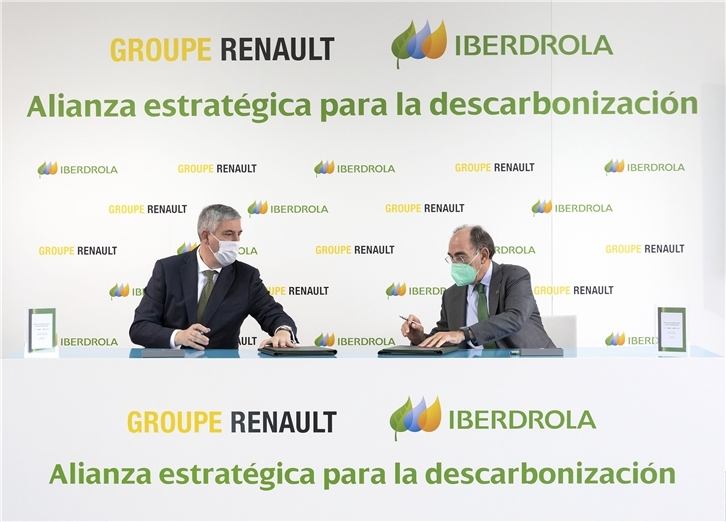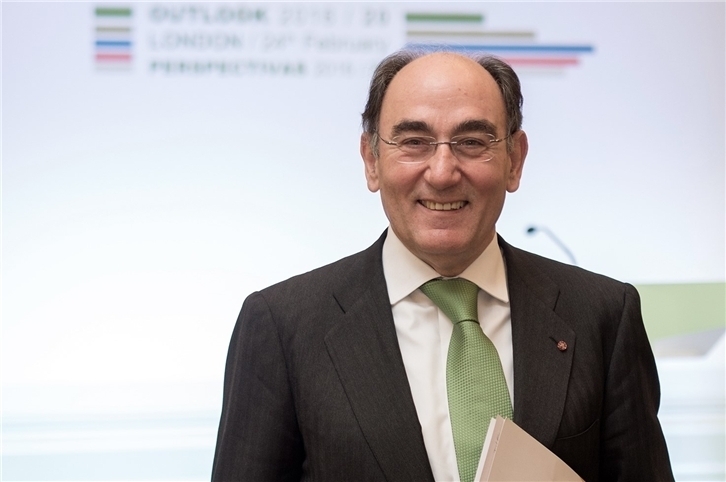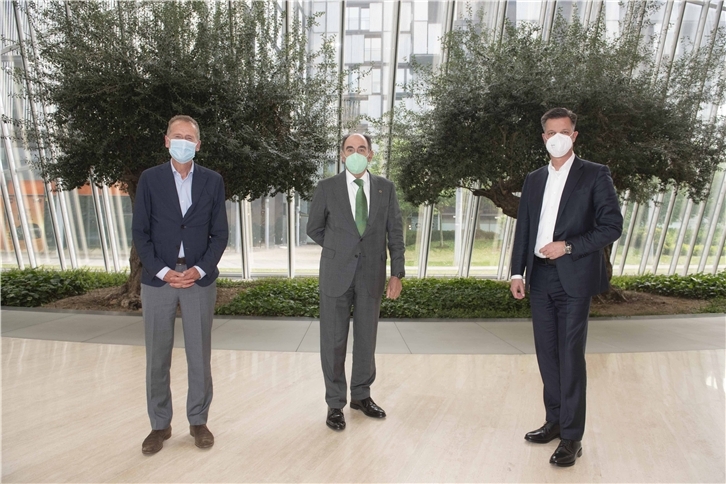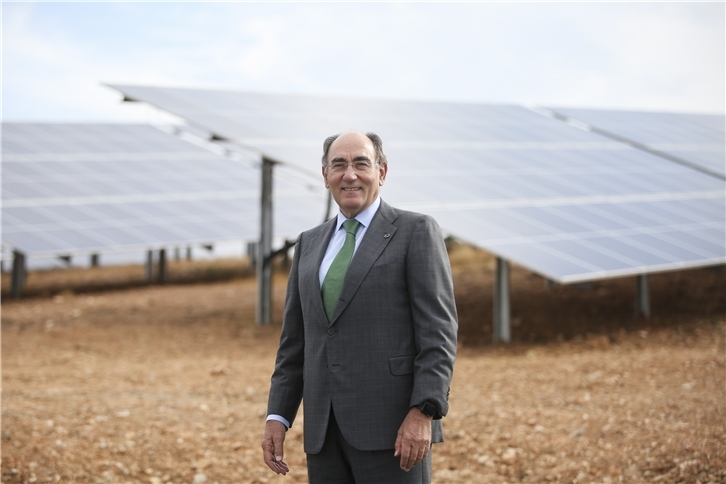News
-
29/04/2021Renault group signs agreement with Iberdrola to reach zero carbon footprint in its factories Renault, a leading electric vehicle manufacturer, and Iberdrola, a world leader in renewable energy, have signed a strategic alliance to decarbonise Renault's plants over the next three years. Renault Group in Spain will strongly contribute to the company's global commitment to bring down emissions from its plants across the world by 50 % in 2030. At the same time, Iberdrola reinforces its leadership in the strategy to decarbonise industry and the economy. José Vicente de los Mozos, industrial director at Renault Group and chairman and CEO of Renault Iberia, and Ignacio Galán, chairman and CEO of Iberdrola, today signed the agreement at Renault's Bodywork and Assembly plant in Valladolid, creating the playbook for achieving Zero Carbon Footprint at Renault plants. Iberdrola becomes the manufacturer's renewable energy supplier through a long-term power purchase agreement (PPA) for 100% of Renault’s electricity needs in Spain. They will also work together on initiatives such as the electrification of heat from thermal processes, the analysis of possible efficiencies in plant energy management through Big Data, the implementation of on-site renewable projects (photovoltaic and wind power plants at their facilities); as well as the reuse of electric vehicle batteries for energy storage to supply Renault. Also included is the analysis and design of electric mobility and charging solutions both for internal use by the plants' own fleets and for related charging (employees' vehicles, third-party companies and end customers). In the case of charging, these solutions will be integrated and offered within the ZE READY TO CHARGE procedure developed by the Renault Group. José Vicente de los Mozos, the Group's industrial director and general manager of Renault Iberia, said: “As Renault Group firmly believes in our responsibility to the environment, one of our objectives is to achieve a zero-carbon footprint in our factories, making us the most environmentally committed automotive company. To this end, we are entering into agreements like the one signed today with Iberdrola which allow us to reduce CO2 emissions in our plants in an innovative way and in line with the 4.0 technologies we are now using. Actions like this allow us to continue working on the future competitiveness of our industrial facilities.” For Iberdrola Chairman Ignacio Galán, the agreement showcases both companies’ commitment to decarbonisation. "We share the same vision for an emission-free economy and have the same goal. Today we are joining forces to reduce not only the emissions that vehicles produce during their lifetime, but also those that are generated through their manufacturing process. This will be the first carbon-neutral car-manufacturing facility, with renewable energy supply, electrification of heat, re-purposing of batteries and the possibility to use other technologies such as green hydrogen. With alliances like the one announced today, Iberdrola and Renault are putting our resources and know-how at the service of a more sustainable society", he explained. After signing the agreement, Galán and de los Mozos visited the factory where the batteries are assembled for the hybrid vehicles produced in Valladolid and Palencia. They also toured the production lines at the Bodywork and Assembly Factory where the plug-in hybrid Renault Captur is manufactured. Lastly, they visited the R&D&i centre in Valladolid which, with the allocations established in the Renaulution strategic plan, will be responsible for all new electrified products produced in Spanish plants. READ MORE

-
29/04/2021A New Energy Giant and Its Boss Set Sky-High Goals In a piece published Wednesday 28 April, The New York Times speaks about Chairman Ignacio Galán’s forward-looking vision on the opportunities for renewable energy in the US. Here are some of the highlights: * For the past 20 years, Ignacio Galán has been on a mission to transform the electricity industry, moving from thermal power generation to renewable energy. * Iberdrola is well positioned to benefit from the opportunities created by the energy transition facing major economies, as both the United States and EU tighten regulations and provide incentives to encourage investment in green energy. * “Galán without doubt was the chief executive of a big utility that first understood that the energy transition from fossil fuels to clean energy was unavoidable and that it would happen fast,” said Miguel Arias Cañete, a Spanish politician and former European commissioner for energy and climate action. READ MORE

-
28/04/2021bp, Iberdrola and Enagás plan to develop the largest green hydrogen project in the region of Valencia bp, Iberdrola and Enagas have reached an agreement to study the feasibility of building, at bp's plant in Castellón, the first phase of the largest green hydrogen production facility in the region of Valencia. The purpose of this agreement is to evaluate the installation of a 20 megawatt (MW) electrolyser for the production of green hydrogen on land owned by bp in the El Serrallo industrial estate. The electrolyser would run on renewable energy produced by a 40 MW photovoltaic plant, among other sources. The bp refinery in Castellón is the largest producer and consumer of hydrogen in the Valencian Community. This new project would replace the grey hydrogen that the refinery uses in its biofuel production process. The use of green hydrogen would reduce CO2 emissions by up to 24,000 tonnes per year, contributing to the plant’s decarbonisation. The project will also explore additional value-added uses for the green hydrogen produced at the plant, such as supplying the heavy transport sector and contributing to the decarbonisation of other energy-intensive industries in the area. A project of the future The 20-megawatt (MW) electrolyser could start operating in 2023, with an investment of approximately €90 million. In further stages, the electrolysis capacity could be increased to 115 MW, becoming the largest green hydrogen project in the refining sector in Spain and the most ambitious in the Valencian Community. In addition to the electrolyser, the project could incentivise an estimated additional investment of around €70 million in new renewable energy facilities and contribute significantly to the economic and industrial recovery of the area, resulting in the creation of high quality, value-added jobs. bp, Iberdrola and Enagás: firm commitment to decarbonization Through this collaboration, bp, Iberdrola and Enagás would advance their respective decarbonisation strategies for the industrial and transport sectors in the Valencian Community, a region in which all three companies are deeply rooted. Carlos Barrasa, Chairman of bp Spain, said: "With this project, bp reinforces its commitment to hydrogen as a fuel of the future, as it will play a fundamental role in the decarbonisation of the energy, industry and transport, especially those that are difficult or expensive to electrify. This is therefore a further step in bp's strategy to transform itself into an integrated energy company, as well as in bp Spain's ambition to lead the country's energy transition, so that it can become a European centre for the production and distribution of energy with a low carbon footprint". Ángeles Santamaría, CEO of Iberdrola España explained that "with the opportunity to lead this technology, we will contribute to making climate neutrality a reality, by acting in sectors that are difficult to decarbonize while boosting a clean industry with enormous potential for job creation. This is an alliance of companies willing to tackle the transformation of their production processes with Iberdrola, which has capacity to produce and supply green energy, and the participation of the supply chain and the incentives of European funds. Together, we will contribute to advancing the technological maturity of green hydrogen, turning it into a competitive solution for the medium-term decarbonisation of industry and heavy transport". Fot Enagás' CEO, Marcelino Oreja, "this initiative fits perfectly with the projects promoted by Enagás based on the following criteria: that they contribute to decarbonisation and a fair and inclusive transition; that they are drivers throughout their value chain; that they help the development of Spanish industry; and that they generate sustainable employment. Collaboration between companies, administrations and institutions is essential for these projects to become a reality, and this is a clear example of joint co-operation". The initiative, which has the support of important local, regional, national and international public and private institutions, is aligned with the Green Hydrogen Strategy of the Valencian Community, as well as with the Hydrogen Roadmap of Spain’s Ministry for Ecological Transition and the Demographic Challenge. It is also part of the call for European Next Generation Funds and a clear proof of the commitment of its partners to advance in the decarbonisation of the economy. READ MORE
-
28/04/2021Iberdrola and Madrid City Council launch the ‘Girls, sport makes us powerful!’ programme Iberdrola and the sports department of Madrid City Council have signed a collaboration agreement to encourage girls and young women between 12 and 24 years of age in the capital to take up sport. Through the ‘Girls, sport makes us powerful!’ project this agreement extends the commitment of both sides to try to prevent girls and young women giving up physical activity and sport According to council data, girls in this age group give up sport more than boys for a number of reasons. Female participation in municipal sports is less than 20% and only 37% in schools where it is promoted. The presence of women in organising bodies and sports management stands at 10%. The signing of the agreement took place in Madrid's Cerro Almodóvar sports complex, located in the neighbourhood of Santa Eugenia, in Villa de Vallecas district, in the presence of the Deputy Mayor of Madrid, Begoña Villacís; the council's sports delegate, Sofía Miranda; and Elisa Yarte, head of sponsorship and global branding at Iberdrola. In addition, professional athletes Elena García Grimau and Lucía Rodríguez Montero held a workshop in which they stressed the importance of their formative years. In total, 5,000 boys and girls from 10 secondary schools in 5 areas of Madrid are to take part in the programme which includes talks and workshops run by sportswomen provided by Iberdrola. The schools are IES Santa Eugenia, IES Villa de Vallecas, IES Gran Capitán, IES Antonio Fraguas Forges, IES Santa Marca, IES Ramiro de Maeztu, IES Manuel Fraga Iribarne, IES Arturo Soria, IES Joaquín Rodrigo and Colegio El Cid. “At Iberdrola we have been supporting women's sport for some years with the conviction that this activity on our part is a contribution in the fight for equal opportunities Through partnerships and projects like this we aim to help raise awareness among girls and young women and their families about the importance of maintaining links with sport as they grow up”, explains Elisa Yarte, head of sponsorship and global branding at Iberdrola. For her part Madrid City Councillor for Sport, Sofía Miranda, highlighted “the importance of support from organisations like Iberdrola to consolidate the rise of women's sport in our city. This programme, focusing exclusively on strengthening the foundations of sport, is designed to raise the visibility of role models for girls and young women and continue to develop an educational and social structure that encourages them to remain within the sporting community”. Iberdrola, a pioneer in promoting women's sport Promoting women's sport has become a key ambition for Iberdrola, and the promotion of true equality between men and women one of its essential values. In 2016, Iberdrola became the first company to make a firm and global commitment to women's equality and empowerment through sport. Currently, the company supports 16 leagues: gymnastics, triathlon, rugby, canoeing, badminton, football, handball, volleyball, hockey, table tennis, athletics, karate, boxing, surfing, ice sports and fencing. Iberdrola also lends its name to 22 national top-tier sports leagues, and 35 other competitions. At the same time, the provision of resources, facilities, medical services and referees, as well as support and sponsorship for different initiatives in this field from Iberdrola has not only helped to increase the number of federated sportswomen in these disciplines by 39% (reaching over 300,000), but is also allowing Spanish elite sportswomen who have built their sporting career in other countries to start competing again in Spain, leading to an improvement in the standard and visibility of national competitions. READ MORE

-
27/04/2021Iberdrola, Volkswagen Group and SEAT S. A. strengthen their strategic alliance The Chairman of the Iberdrola Group, Ignacio Galán, met with Herbert Diess, CEO of Volkswagen Group and Chairman of the Board of Directors of SEAT S.A., and Thomas Schmall, Head of Technology of the Volkswagen Group Executive Committee and CEO of Volkswagen Group Components, at the Iberdrola Tower in Bilbao to continue strengthening their strategic alliance. The main objectives of the collaboration agreement, under which Iberdrola has become a strategic partner of the Volkswagen Group and SEAT S.A., are to supply renewable energy in the electric vehicle value chain and to promote the development of a public charging infrastructure network. The alliance also includes the supply of energy with guarantees of origin (GOs) and other energy solutions to the group's end customers and its dealer network. Herbert Diess, CEO of the Volkswagen Group, was delighted with the meeting, commenting, "A good meeting with Ignacio Galán today!", and introducing Thomas Schmall, who, "has been a driving force behind the Spanish electrification agenda in his first 100 days as Head of Technology”. He added that, "Together, Volkswagen and Iberdrola are geared up to continue working with each other throughout the entire supply chain, from energy generation, battery production, storage and charging, through to transformation of our plant in Martorell to manufacture an electric vehicle in Spain". "As Thomas confirmed, we need green energy every step of the way and Iberdrola can supply it. ¿Why? Because they have been far bolder, moving away from coal and focusing exclusively on renewables from the outset. Ignacio's leadership and perseverance are bearing fruit. Of course, we have also discussed the political situation and the need for equal conditions with respect to subsidies throughout Europe, so we will also join forces in our dialogue with politicians." READ MORE

-
26/04/2021Iberdrola prequalifies for France's next offshore wind capacity auction Iberdrola has been pre-qualified for the next offshore wind capacity tender in France, the Normandy offshore wind farm in the English Channel, with a capacity between 900 and 1,050 MW. The company will now enter the competitive dialogue phase, during which the details of the project will be discussed with the French government before preparing and submitting the bid. The final award decision is expected to be made public in February 2022. On 15 January, the French government opened the pre-qualification process for this project, which is located some 32 km off the coast of Barfleur, with a 500 km⊃2; zone which will be further reduced throughout the Competitive Dialogue and de-risking campaigns. Fixed foundation technology will be used, given the water depths. "The continued development of offshore wind energy is vital to decarbonize the economy. Normandy represents a major milestone for France's energy transition, as it is the first project within the Multiannual Energy Plan which states the French Government’s commitment to award 1GW of offshore wind per year. As a world leader in offshore wind, with major projects already operating in the North Sea and the Baltic, and with the construction of Saint-Brieuc offshore wind farm underway, we are confident that we can bring our expertise and delivery capabilities to the development of this new project," said Javier García Pérez, Iberdrola's Offshore Wind Business Director. Among the leading developers with a 19,000 MW pipeline Iberdrola's decision to participate in a new offshore wind project in France is in line with its strategy to lead the industry while strengthening its presence in a strategic market for the company. Following a number of offshore wind transactions in recent months, the company has a project pipeline of some 19,000 MW, in established markets such as the United Kingdom, the United States, France and Germany. Iberdrola has also entered emerging markets such as Japan, Sweden, Poland and Ireland. This strategy has already enabled the company to operate offshore wind farms in the German Baltic Sea (Wikinger), the North Sea (East Anglia ONE) and the Irish Sea (West of Duddon Sands). The company is also making progress on the Vineyard Wind ONE offshore wind farm project (800 MW off the coast of Massachusetts), Saint Brieuc, in Brittany, France, which will begin construction on 3 May, Baltic Eagle in German waters and East Anglia Hub in the North Sea. France, a strategic market In France, Iberdrola operates as a wind power developer (onshore and offshore) and as a clean energy retailer. It currently has a customer base of 400,000 and aims to reach one million supply points by 2023. In addition to Saint Brieuc offshore wind, renewable projects include Aalto Power, a company acquired in June 2020, which operates 118 MW of onshore wind and has a pipeline of 700 MW of wind and photovoltaic projects under development. Iberdrola plans to invest €4 billion in the French market by 2025, mainly in renewable energy projects, thus helping to maintain industrial activity and hundreds of thousands of jobs. The group awards orders worth almost €1 billion a year to French companies such as Eiffage, Nexans, Vinci and Schneider, and it also procures with Spanish companies such as Navantia and Windar. Green investments for economic and employment recovery Iberdrola has been leading the energy transition for two decades, acting as a key driving force in the transformation of industry and the green recovery of the economy and employment. To this end, the company has launched a major investment plan of €150 billion over the next decade – €75 billion by 2025 –, aimed at tripling renewable capacity and doubling the value of its network assets while take advantage of the opportunities of the energy revolution facing the world's leading economies. In Spain, investments to 2025 amount to €14.3 billion, mainly for the deployment of an ambitious renewables and smart grids plan. In Spain, the company is the leader in the renewable sector with an installed capacity of more than 17,400 MW which will increase to 25,000 MW by 2025. Following investments of €120,000 million over the past twenty years, Iberdrola has become a global leader in renewable energy with nearly 35,000 MW installed worldwide, making its generation fleet one of the cleanest in the energy industry. With emissions of 98 grCO2/kWh, two-thirds lower than the European average, the strategy of investing in clean energy and networks will make Iberdrola a "carbon neutral" company in Europe by 2030. READ MORE
-
26/04/2021Iberdrola launches €5 billion sustainable promissory note programme, the largest ever for a Spanish company Iberdrola,through its Iberdrola International B.V. subsidiary,[1] has launched the largest sustainable promissory note programme for a Spanish company, with a maximum balance of €5 billion The company has expanded its Euro Commercial Paper (ECP), a framework programme for issuing short-term promissory notes in the Euromarket, with a limit previously set at €3 billion. Going forward, commercial paper will also be linked to indicators related to the three ESG areas (environment, social and governance). Iberdrola's promissory notes are open to investors focused on socially responsible investment, in line with the Sustainable Development Goals (SDGs) of the UN's 2030 Agenda. That is why the company insists on a high level of standards in the programme and, in case of non-compliance with the established ESG indicators, would refrain from issuing sustainability-denominated notes until they are met again, as it would reduce the attractiveness for this type of investor. The ECP programme is the group's first short-term financing instrument and is linked to ESG indicators, that encompass five SDGs: * Environment (SDGs 7 and 13): reduce emissions intensity to 100 g/kwh by 2022. Iberdrola has already improved this ratio, with 98 g/kWh in 2020. * Social (SDG 5): increase the percentage of women in leadership positions to reach 25 % in 2022. * Governance (SDGs 16 and 17): Apply 11 recommendations from the Task Force on Climate-related Financial Disclosures (TCFD) to create efficient, transparent and responsible institutions, including the commitment to disseminate compliance in the Company's Sustainability Report and audit this externally. As there is no current standard model for sustainable short-term financing models, Iberdrola has based this new structure on the Sustainability-Linked Loans Principles of the Loan Market Association (LMA) and on the Sustainability-Linked Bond Principles of the International Capital Market Association (ICMA). For certification, the company has used VigeoEiris, which has issued the corresponding Second Party Opinion. 63% of debt will be green and sustainable by 2025 Iberdrola has consistently led the way in sustainable financing. The company is the largest private green bond issuer in the world and was the first Spanish company to issue green bonds in 2014. At present, the group has outstanding green or sustainability-linked financing of more than €32 billion, of which more than €13 billion are green bonds. Also, 90% of its credit lines already incorporate sustainable criteria. Iberdrola's strategy is for its financing structure to have an increasingly higher percentage of green and sustainable products, reaching 63% of the total by 2025. Specifically, 100% of its credit lines and 70% of its hybrid bonds will meet these characteristics in 2021. This approach to financing responds to the major €75 billion investment plan launched by Iberdrola between now and 2025, aimed at doubling its renewable capacity to 60,000 MW and increasing the value of its network assets to €47 billion. A plan that aims to promote the decarbonisation of the economy and, with it, economic recovery and employment. With planned investments by 2030 standing at €150 billion, the group will reach an installed capacity of approximately 100,000 MW. [1] Dutch issuer with the guarantee of Iberdrola S.A. READ MORE

-
22/04/2021Wallbox joins forces with Iberdrola for 100 % renewable energy consumption in its new factory and offices in Barcelona Wallbox and Iberdrola have signed a long-term on-site) Power Purchase Agreement (PPA) to produce, consume and reuse 100 % of the energy produced at its plant and offices in Barcelona’s Zona Franca. Iberdrola’s investment in the photovoltaic installation will allow Wallbox to make savings in the production and consumption of green energy from day one. In this way, the energy company continues to highlight the competitiveness of renewables through bilateral contracts that promote energy supply at competitive and stable prices with large customers committed to sustainable consumption. With this collaboration, Wallbox will meet its goal of operating in these facilities with energy autonomy, as well as reducing its carbon footprint, putting itself at the forefront of productive energy management by relying mostly on solar energy. The Wallbox factory in Barcelona’s Zona Franca will have photovoltaic solar panels that will produce 1,500 kWh/day for the self-consumption of these facilities and offices, equivalent to the consumption of 500 homes. Installation at the offices will begin at the end of April and is expected to be completed by the end of June, allowing the photovoltaic system to come into operation at the beginning of the second half of the year. Smart, bidirectional energy The facilities will also have a unique, smart and bidirectional energy management system, which will optimise generation, storage and use of the grid. Through regeneration, 75 % of the energy consumed in the production process is returned to the internal energy grid for reuse. The new plant is expected to be fully operational in September this year. Both due to the volume of green energy production generated, as well as due to the development of a new generation of nZEB (Zero Energy Building) buildings, the Wallbox plant is a pioneering building with almost zero energy consumption, aligning itself with the trends of the new sustainable engineering, as well as in self-consumption at a global level. “These collaboration formulas, in which Iberdrola invests and allows its customers to save from the outset by producing renewable energy at its facilities, highlight the competitiveness of renewables and continue to open up opportunities for undertaking projects that are transforming the present and future of energy in our country. These long-term power purchase and sale contracts provide stability to customers and have become an optimal tool for managing the electricity supply of large consumers who are committed to clean and sustainable consumption. In this case, we also maximised the infrastructure by taking advantage of the available surface area on the factory roofs, which we combined with an innovative energy efficiency system”, explains Raquel Blanco, global director of Smart Mobility at Iberdrola. “With this unprecedented action in the industry, we wanted to demonstrate our commitment to accelerating the process of adopting cleaner energy in everyday life. Energy consumption around the world is changing at an accelerating pace, which leads us to develop products that promote decarbonisation. Thanks to this agreement, our products will also be manufactured with renewable energy, therefore closing the production circle in the most sustainable way possible,” said Enric Asunción, CEO of Wallbox. Taking self-consumption to the next level In February this year, Wallbox launched a pilot project to apply bi-directional charging technology to enable the use of energy stored in electric car batteries to supply part of the surplus energy demand of its corporate offices. The system, installed at the corporate headquarters in Barcelona’s Zona Franca, consists of a fleet of Quasar bi-directional chargers and a fleet of Nissan Leaf electric vehicles. The vehicles are available for use by Wallbox employees and are recharged at night to power the offices during the day. In this way, the building behaves as a smart ecosystem, where its architecture is maximised to capture available solar energy and release or store it on demand through the cars, which act as buffers at times when the building’s energy demand exceeds either the contracted power or that generated by the solar panels. “This innovative ecosystem has a dual system of stationary and mobile batteries. The former offer the first line of basic coverage and are configured to charge with a purely renewable energy mix, while the latter squeeze the flexibility capabilities offered by electric vehicles, both for emission-free mobility and as a storage resource with high energy density,” said Eduard Castañeda, CPO of Wallbox. “The benefit is again twofold as Wallbox employees are offered access to a sustainable means of transport, while at the same time the need for power from the grid is reduced, as the vehicles become both generators and storage. The grid becomes more flexible and efficient with the flattening of the generation/consumption curve”. The intention is to increase the fleet of vehicles and Quasar bi-directional chargers until full energy supply autonomy is achieved. Right now, Wallbox already has 7 of them and the fleet will be increased by 15 additional vehicles. “We not only seek to develop the new technologies that will enable the use and management of clean energy globally, but we are also playing a leading role in their adoption. We live our commitment to sustainability from within, it is in our DNA”, concludes Casteñeda. READ MORE









